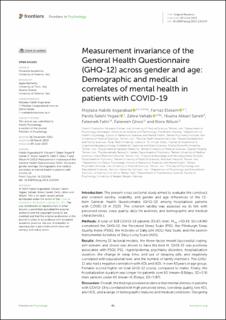| dc.description.abstract | Introduction: The present cross sectional study aimed to evaluate the construct and criterion validity, reliability, and gender and age differences of the 12-item General Health Questionnaire (GHQ-12) among hospitalized patients with COVID-19 in 2020. The criterion validity was assessed via its link with perceived stress, sleep quality, daily life activities, and demographic and medical characteristics.
Methods: A total of 328 COVID-19 patients (55.8% men; Mage = 50.49, SD = 14.96) completed the GHQ-12, the Perceived Stress Scale (PSS), the Pittsburgh Sleep Quality Index (PSQI), the Activities of Daily Life (ADL)-Katz Scale, and the Lawton Instrumental Activities of Daily Living Scale (IADL).
Results: Among 13 factorial models, the three-factor model (successful coping, self-esteem, and stress) was shown to have the best fit. GHQ-12 was positively associated with PSQI, PSS, Hyperlipidemia, psychiatry disorders, hospitalization duration, the change in sleep time, and use of sleeping pills, and negatively correlated with educational level, and the number of family members. The GHQ-12 also had a negative correlation with ADL and IADL in over 60 years of age group. Females scored higher on total GHQ-12 scores, compared to males. Finally, the hospitalization duration was longer for patients over 60 (mean = 8.8 days, SD = 5.9) than patients under 60 (mean = 6.35 days, SD = 5.87).
Discussion: Overall, the findings provided evidence that mental distress in patients with COVID-19 is correlated with high perceived stress, low sleep quality, low ADL and IADL, and a range of demographic features and medical conditions. Designing psychological interventions for these patients that target the aforementioned correlates of mental distress is warranted. | en_US |

